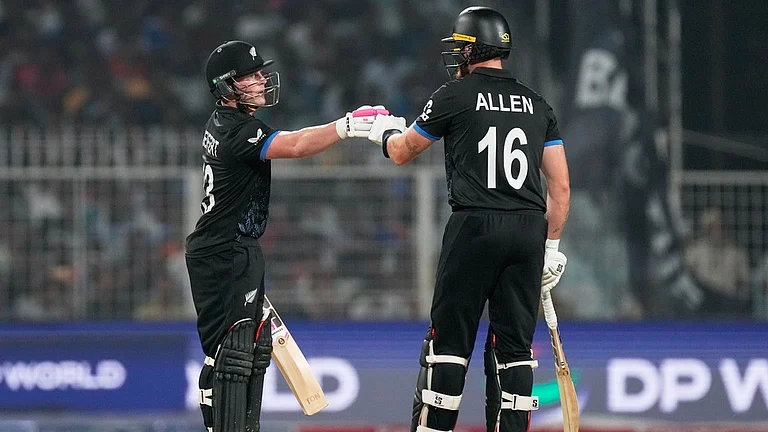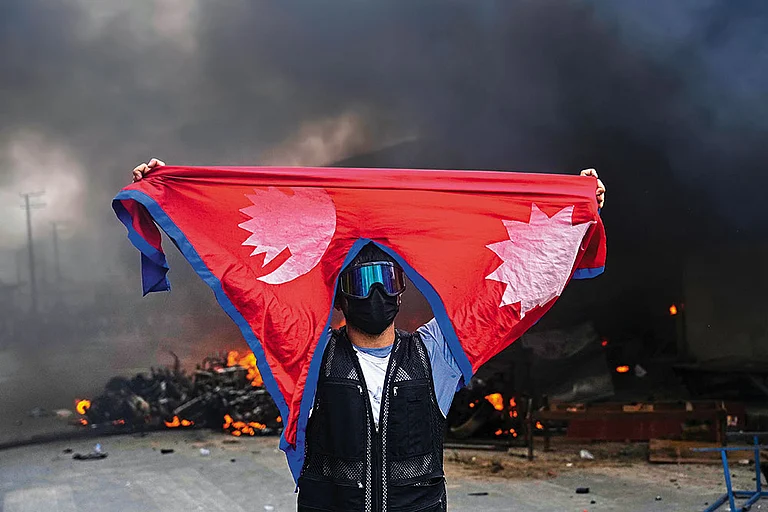A 70-year-old woman, Ningavva Shiggadi, bows down in gratitude before she steps foot into a BMTC bus. It was the day when the Karnataka government rolled out its first of the five major poll promises in the state – free bus rides for women and transgender people in government-run buses. Ningavva Akka was able to travel from Dharwad to Savadatti in Belagavi district for free. And so can 41.18 lakh women who are set to benefit from the scheme.
The Congress party stormed into the Vidhan Soudha in Karnataka by securing 135 out of 224 seats, winning an absolute majority. The party’s election manifesto – 'Sarva Janangada Shanthiya Thota', which translates to a peaceful garden of all communities – had promised to implement five guarantees. These were free food grain, free electricity, an unemployment stipend, monetary benefits to housewives, and free bus travel for women, among other promises, against a backdrop of rising prices of commodities.
Almost a month after being in power, the party has started taking these promises right to the people.
‘Shakti’ For Women - Free But Conditions Apply*
The first promise that the Siddaramaiah-led government ticked off was the Shakti scheme which is expected to benefit 25 million women across the state at a cost of over Rs 4,051.56 crore to the exchequer every year.
The scheme had promised “free travel to all women throughout the state”. Elated travellers shared photos with their zero-fare tickets on social media platforms. Reports estimate that over 40 lakh women use public transport each year in the state, with the number expected to climb after the free scheme has been rolled out.
Over five lakh women (approximately 5,71,023) women travelled on the buses of four RTCs in Karnataka on the first day of the rollout of the scheme.
“Tells us the pent-up, unfulfilled demand of women’s mobility when they can’t or aren’t allowed to afford it. Imagine an increase in skills, education, consumption, livelihoods, and economic activity due to increased mobility! This ain’t no freebie; it’s an investment in human capital,” activist Tara Krishnaswamy says.
While the move is certainly laudable, the facility is limited to women with a state identity. Only those women who are domiciled in Karnataka and can produce an identity document to show the same can avail of the smart card for free bus travel. This has excluded migrant women, who form a large part of the state’s population and economy, from availing of the facility.
A study conducted by the Council for Social Development for the Karnataka Evaluation Authority and Department of Labour, Karnataka, shows that less than 50% of the migrants sampled earned less than Rs 6,000 per month. The Covid-19 pandemic further relegated them to the lowest rungs of society – living in precarious conditions, with erratic supply of electricity and daily food requirements.
“I cannot stand for long hours anymore,” says Ameena*, whose sister and mother both work as domestic helpers in Bengaluru. “People expect us to work for the whole month with just two days off and a lesser salary than what was given during the lockdown.” But we have no option because the head of the household – referring to her father – is not employed, she says.
Similar schemes in Delhi and Tamil Nadu have shown that the government’s decision to implement free bus travel for all women (unlike Karnataka), has opened up a wide array of opportunities for these women to reclaim public spaces. Karnataka’s scheme as of yet, does not include migrant women who are feared to be among the most marginalised and vulnerable sections of the society.
‘Anna Bhagya’ Faces Hiccups
The Congress government has also scheduled the launch of the ‘Anna Bhagya’ scheme on 1 July.
The scheme promises 10 kg of free food grains to those Below Poverty Line (BPL) and Antyodaya card holders. However, even before the launch of the scheme, it faced a setback as the Food Corporation of India (FCI) had written to the state over its inability to supply additional rice, the CM claimed.
Siddaramaiah alleged that the Centre is trying to block its scheme even though the FCI had cleared sales to it. “We had written to FCI on June 9 that they should give us 2.28 lakh metric tonne rice. They answered on June 12 that they will supply the same. However, on June 14, the MD and the chairman of the Food Corporation of India wrote to us that it cannot give us rice," Siddaramaiah said.
However, the government has reached out to get rice from other sources and producing states – Chhattisgarh, Telangana and Punjab governments. Meanwhile, the FCI had responded that the curbs on the sale of rice were aimed at regulating price rises.
The Congress plans to hold protests at all district centres against the Union government on Tuesday for denying the required quantum of rice to the state.
Another promised scheme was to provide up to 200 units of free electricity to all residential households in Karnataka – ‘Gruha Jyoti’ scheme, which is not just restricted to those staying in their own households but will also be extended to the tenants as well. On the first day of its rollout on Sunday, over 55,000 consumers registered for the scheme’s benefits, stated an official government release.
Other Schemes To Roll Out Soon
Under ‘Gruha Lakshmi’, Rs 2,000 monthly assistance will be provided to the woman head of every family. For the same, bank accounts have to be linked to Aadhaar. Due to technical problems in Aadhaar linking, and determining who is the family head, the verification process is expected to finish by August 15 when the payments will begin.
The fifth promise of unemployment stipend under 'Yuva Nidhi' guarantee will allow youth who remain unemployed six months after their degree to apply to avail Rs 3,000 per month for 24 months. The date of the rollout of the scheme is not yet clear.
Repealing 'Anti-People', 'Unjust' Laws
Even before Congress secured a victory in the state, party leaders have maintained that if voted to power, the government will review “regressive decisions” of the Bharatiya Janata Party government such as revision of school textbooks and laws against conversion and cow slaughter.
It all started with a few lines in the Congress manifesto which the party issued prior to the elections. A ban on all organisations, including the Popular Front of India and Bajrang Dal, if they were to create communal rifts in the society and to repeal “anti-people” and “unjust laws”.
The campaign lines triggered a political storm, with the BJP’s star campaigner Prime Minister Narendra Modi appealing to the voters to cast their vote after chanting chants of Bajrang Bali or Lord Hanuman. The campaign, however, failed to yield the desired result.
A month after new ministers were sworn in, the Cabinet decided to repeal the anti-conversion law passed by the previous BJP government. The contentious Karnataka Protection of Right to Freedom of Religion Act, 2022 was criticised by opposition parties, lawyers and activists alike as it was considered to be more stringent than similar laws introduced in other states – Uttar Pradesh, Madhya Pradesh and Gujarat. The Karnataka law said that anyone who does illegal conversion will face a jail term of three to 10 years and a fine of Rs 50,000.
Peter Machado, the Archbishop of the Bangalore Archdiocese welcomed the repeal. “On behalf of the Christian Community, I express my profound gratitude and satisfaction towards the Government of Karnataka .. for this commendable step, taken in response to concerns raised by various stakeholders and in recognition of the importance of upholding fundamental rights”.
What’s In, What’s Out Of Textbooks?
Another major poll promise made by Congress was textbook revision. The ousted BJP government had introduced a lesson on Hedgewar when right-wing ideologue Rohit Chakrathirtha was at the helm of the textbook revision committee.
The Congress government dropped this lesson and reintroduced ‘Letter to my daughter’ by the first Prime Minister of India Jawaharlal Nehru, translated by Siddanahalli Krishna Sharma, in the class 8 (Kannada language) textbook.
The previous BJP government had dropped the lesson, stating that it was more important to learn about how to be an "ideal man" in society (referring to Hedgewar’s lesson) than learning what Nehru wrote to Indira Gandhi.
In addition, the Congress government has also dropped the works of other right-wing ideologues such as Chakaravarthy Sulibele and Shatavadhani Ganesh in class 10 Kannada language textbooks.
What’s Next?
Corruption was among the key planks on which Congress fought the recent Assembly elections and secured a convincing victory. Following the same, demands have grown in recent days to form teams and begin inquiries into various scams that the party raised its voice against when it was in the Opposition.
All eyes are also on the contentious hijab row that erupted in educational institutions in the state. Without making a direct reference to the issue, MLA Priyank Kharge said that the government will look into the legal aspect of the decision. “There is data to show that nearly 18,000 students are left out of schools because of a certain order,” he was quoted as saying by the Indian Express.
While the Siddaramaiah-led government has already put on hold works sanctioned by the BJP government across all departments and agencies, the next few months will stand as a test for the grand old party as it looks to fulfil all its promises and planks that it won the election on.






















